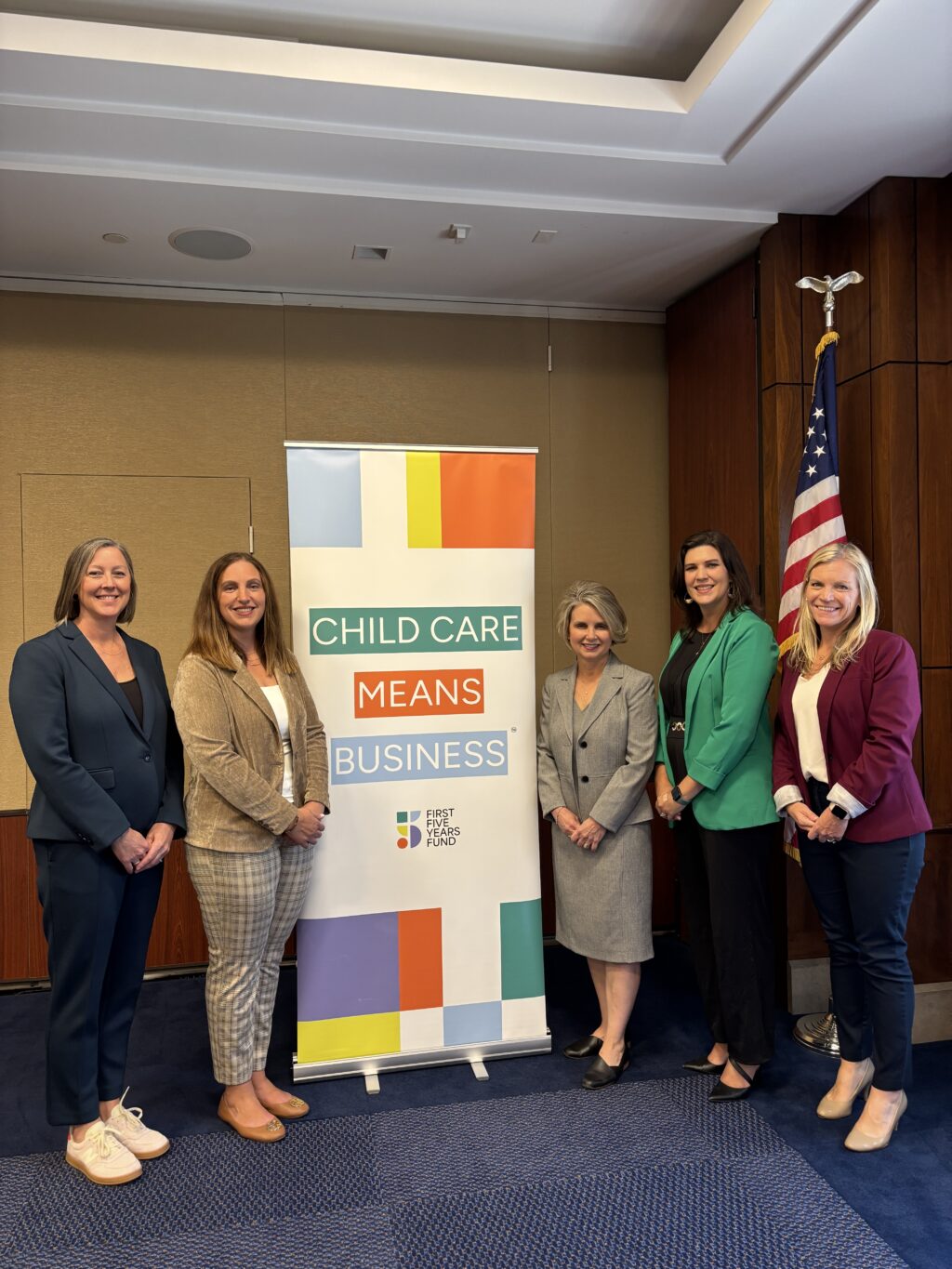The First Five Questions for: Andrew Zimmern

In the latest installment of FFYF’s First Five Questions series, Sarah Rittling sat down with award-winning chef, restaurateur, and advocate Andrew Zimmern for a conversation about the intersection of child care, working families, and the restaurant industry.
Drawing from his decades in food service and his leadership with the Independent Restaurant Coalition, Zimmern highlighted the urgent need for policies that support working parents—especially in an industry built on razor-thin margins and unpredictable hours. Together, they explored how access to affordable, accessible child care isn’t just a family issue: it’s a workforce issue, an economic issue, and, there is, as Zimmern passionately shared, “a moral principle at stake here”.
Check out the video below and read highlights and transcripts from their conversation:
Zimmern on the issues he and the Independent Restaurant Coalition are looking to tackle:
Now we’re expanding what our purview is. We want to be issue oriented. We want to pick specific issues because we know that’s where we can be successful, So that means fighting for all kinds of policies for the industry as long as they are equitable, sustainable, and family friendly.
When we talk about families, one of the big ones is pay equity and gender pay equity because so many single moms are a part of the restaurant community. Another one is child care. The hours in restaurants are not conducive – a nine to five job is hard enough. So imagine if your employer said, “Come around 10, but we don’t know when you’re going to be able to get off.”
You may not be able to. Or, if we’re busy and someone doesn’t show up at night, you need to stick around and serve those tables, or cook on that line, or wash those dishes, or stay at the host stand or stay behind the bar, regardless of what time you need to pick up a child at school. And they don’t have the benefits that are conducive to single parenting, or even dual income families that have two parents or caregivers.”
–
Zimmern on what his blue sky ask of Members of Congress and lawmakers is:
We need a restaurant industry that truly supports everyone. You hear all the time about restaurant worker burnout, and we’ve exited more people than we’ve onboarded, and all of the struggles involved. So many people during the Covid crisis took a look at their lives. They realized they were feeling differently and didn’t return. By the way, not just to the restaurant industry. To every industry. There was more change of careers than ever before.
But let’s confine ourselves to the independent restaurant industry, which is the one that I love the most.
I think a great place to start, and it’s your issue as well: Number one is affordable accessible child care. If we do that it becomes so much easier for single moms and single dads and dual income, co-parented, co-caregiving families as well.
We [the restaurant industry] are the largest employer still, I believe, of single moms and single dads. The last data I saw on that was a year ago, and I’ve no reason to think it changed.
So many people turn to restaurants for those flexible set schedules. We’ve become more rigid. We used to be a place that was easier for them to be. We’ve become much more rigid because the stakes are higher, the competition is harder, the dollars are harder to come by, and we’ve also marginalized other workers. So it comes with, there’s never one way to solve a problem.
If you give affordable, accessible child care as a backstop benefit. I would like to see that supported by the Fed, the cost of doing that, by the way, is a rounding error in the federal budget. So it seems to me, in an industry that represents 6% of the GDP and employs 10 to 11 million people, it’s a Congressional no brainer to be backstopping restaurants so that everyone can do that.”
Zimmern on what gives him hope:
A handful of us have been talking for 30 years at a public level about food as a connector.
Food as a means to solve problems, as a way to unite human beings. I did a show called Family Dinner on TV, where I just showed up at people’s houses and had dinner with them. On Bizarre Foods we always had a family meal in it. Both of those were born of my desire for people in Australia to see how families in Ghana had dinner, and for families in Lagrange, Wisconsin, to see how people in a French village ate. Families have way more in common than we ever thought. Human beings have way more in common than we ever thought
Jose Andres, one of my close friends, always talks about the need for longer tables, because smaller tables have worked. So let’s just extend them and bring more people to the table. People forget the perquisite for having longer tables. It’s because people really can unite over food. It is one of the most valuable social connection tools we have.
Transcript below*:
Sarah Rittling: Hello, and welcome to our First Five Questions series, where we talk to interesting leaders about challenges facing families and children and what we can do to address them. I couldn’t be more thrilled to be joined today by Chef Andrew Zimmern, who, in addition to being an award winning chef and restaurateur, has been a wonderful advocate. Chef, welcome.
Andrew Zimmern: Thank you. Nice to be here.
Rittling: Great to have you. Let’s kick it off with our first question.
QUESTION 1: WHAT ISSUES ARE YOU AND THE INDEPENDENT RESTAURANT COALITION (IRC) LOOKING TO TACKLE?
We consider ourselves here at the First Five Years Fund fortunate to be able to work with the wonderful team at the Independent Restaurant Coalition (IRC), an organization you helped to found in 2020. Why don’t we start by broadly talking about all the great work IRC does for children, families, and the industry. What issues are you and the IRC looking to tackle?
Zimmern: It’s a big question, and I think it has some really specific answers. Anytime that we are helping a restaurant worker of any kind, anytime that we are representing that industry de facto, we are helping parents and families maintain jobs, gain equity where it’s needed, maintain equity where it’s in jeopardy and fight for equity where it’s been lost.
We started the IRC when Covid hit, because we saw a huge problem coming up with all of these mandatory closures, and the very nature of the restaurant industry being one made up of people who are a very special and talented, unique, highly skilled group.
I love food people more than any other people on planet Earth. I am a restaurant person. In two weeks I will celebrate my 50th anniversary of my first job in a restaurant – and I’ve never stopped.
The restaurant community is the largest or second largest employer of first-time job seekers, last-time job seekers, single moms and dads, citizens coming from jails and institutions, new immigrants, legal and illegal. We have so many special different groups that make up the backbone of this industry. Because of that if they lose a job in a restaurant, they don’t turn to Linkedin and grab another VP job at the investment bank down the street.
It is incumbent upon us to preserve worker integrity, worker value and benefits for that group because they don’t have a lot of people fighting for them.
If that group, ten to eleven million strong, depending on whose data you look at, that is a huge number of people that slide underneath the line at which they become dependent on so many other places for resources. When we burn those resources out it costs us too much money..
And of course a huge percentage of those are parents or part of families, the same group that you guys fight for. When we were founded, we decided we were only going to fight one issue. That was making sure PPP is preserved. We did a great job with that and it worked.
Now we’re expanding what our purview is. We want to be issue oriented. We want to pick specific issues because we know that’s where we can be successful. So that means fighting for all kinds of policies for the industry as long as they are equitable, sustainable, and family friendly.
QUESTION 2: WHAT ARE THE CHALLENGES YOU’VE SEEN IN THE RESTAURANT AND CULINARY INDUSTRY SPECIFIC TO CHILD CARE ISSUES?
So when we talk about families, one of the big ones is pay equity and gender pay equity because so many single moms are a part of the restaurant community. Another one is child care. The hours in restaurants are not conducive – a nine to five job is hard enough. So imagine if your employer said, “Come around 10, but we don’t know when you’re going to be able to get off.”
You may not be able to. Or, if we’re busy and someone doesn’t show up at night, you need to stick around and serve those tables, or cook on that line, or wash those dishes, or stay at the host stand or stay behind the bar, regardless of what time you need to pick up a child at school. And they don’t have the benefits that are conducive to single parenting, or even dual income families that have two parents or caregivers.
Child care becomes a huge piece of this puzzle because of the parents we employ. So many people forget about that; they look at this and say, “Well, you don’t employ children.” And no we don’t, we employ people who have children.
I’m not a politician. I just play one on television sometimes. But there are technical things we can do, refundable tax credits for small businesses that offer child care benefits. That’s a huge thing for people looking for a job in a restaurant, if that restaurant can provide child care benefits. Tax incentives can make that easier.
Restaurants are a penny’s profit business, they exist on razor-thin margins.
Those margins are getting smaller because of the economy and all the other problems that we are dealing with over the last four, five, six months. So it’s incumbent upon us to support working parents now more than ever. It’s a huge, huge task and really, really important.
QUESTION 3: WHAT ADVICE WOULD YOU GIVE OTHER MEMBERS OF THE CULINARY COMMUNITY, WHO WANT TO BE MORE INVOLVED, WHO WANT TO USE THEIR VOICE AND SHARE THEIR STORIES?
Zimmern: The restaurant industry is tough. Most restaurants are operating as we know it on thin margins. We need to preserve our restaurant industry. Independent restaurants alone are six percent of the GDP. That’s a massive number. So as good global citizens, we can’t afford to let this industry fail or its employees fail.
We also have a notoriously hard, increasingly difficult time maintaining employees. So if we want to maintain employees, we have to fight for the issues that make our workplaces appealing to potential employees. So that’s why we have to solve things like child care issues. I think that’s just one of many reasons? We need to do the right thing in our lives. There is a moral principle at stake here, that when you look back at the history of self development in human history, these are vital pieces of being successful in life.
QUESTION 4: WHAT’S THE BLUE SKY THAT YOU’D ASK THAT MEMBERS OF CONGRESS WERE DOING?
Zimmern: We need a restaurant industry that truly supports everyone. You hear all the time about restaurant worker burnout, and we’ve exited more people than we’ve onboarded, and all of the struggles involved. So many people during the Covid crisis took a look at their lives. They realized they were feeling differently and didn’t return. By the way, not just to the restaurant industry. To every industry. There was more change of careers than ever before.
But let’s confine ourselves to the independent restaurant industry, which is the one that I love the most.
I think a great place to start, and it’s your issue as well: Number one is affordable accessible child care. If we do that it becomes so much easier for single moms and single dads and dual income, co-parented, co-caregiving families as well.
Zimmern: And the reason that I’m going to list that first, is, in part, because I’m talking to you. But we [the restaurant industry] are the largest employer still, I believe, of single moms and single dads. The last data I saw on that was a year ago, and I’ve no reason to think it changed.
So many people turn to restaurants for those flexible set schedules. We’ve become more rigid. We used to be a place that was easier for them to be. We’ve become much more rigid because the stakes are higher, the competition is harder, the dollars are harder to come by, and we’ve also marginalized other workers. So it comes with, there’s never one way to solve a problem.
If you give affordable, accessible child care as a backstop benefit. I would like to see that supported by the Fed, the cost of doing that, by the way, is a rounding error in the federal budget. So it seems to me, in an industry that represents 6% of GDP and employs 10 to 11 million people, it’s a Congressional no brainer.
QUESTION 5: WHAT GIVES YOU HOPE?
Zimmern: It’s because of the people in our industry. And it’s because of the nature of hospitality. People seek out these jobs because even if they can’t put a label on it themselves, or even if they have a block that prevents them from seeing it entirely, if you’re in the hospitality business you are predisposed to want to do things for other people and solve problems.
I really believe in the power of the people in our industry. They’ve been asked to pivot a million times. They’re the smartest, most creative human beings that I know of.
We keep making changes every year, and in some restaurants every day, (and I’m not making a yes, we change the menu joke based on what comes into the marketplace). We’re used to change, and we embrace it, and we’re very creative about it.
Second thing would be internally, in the restaurant community, there is more enthusiasm now to change the models and more enthusiasm to professionalize ourselves as small businesses. You know a lot of restaurants that make a million dollars a year, small little restaurants – a hamburger/hotdog place that is operated by its owners and maybe two or three other employees. They’re seeing the benefits for professionalizing to bring a few extra for their bottom line so that they can afford things to keep their two, three, four, five employees with them and not going to the fast food place across the street, that because it’s a trillion dollar business is getting a lot of government support that the little million dollar business isn’t. It’s so out of whack. But I believe people are seeing the need for it, because we have some momentum with change.
We have real proposals out there with real support. I’m very much aware of the Restaurant Service Change Tax Fairness Act, because that’s something that the IRC is a part of, the Britt-Kaine package is one that you guys have been very involved in and is something that I became aware of when we started preparing for this conversation. We’re seeing real bills with real change. I’m a co-founder of the Coalition for Sustainable Aquaculture, and one of the things that we’ve noticed is that we actually have some support in Congress to get this passed now, currently, maybe more than ever before. So when I look at this landscape, I’m like, “Wow, we do have a lot of food issues that have gotten enough traction.”
And I think those in our Senate and in our Congress are seeing some of the interconnectedness of our food system that they didn’t see before, shockingly. Why, now? But I’ll take it.
And the other thing: I truly believe – you know a handful of us have been talking for 30 years at a public level about food as a connector.
Food as a means to solve problems, as a way to unite human beings. I did a show called Family Dinner on TV, where I just showed up at people’s houses and had dinner with them. On Bizarre Foods we always had a family meal in it. Both of those were born of my desire for people in Australia to see how families in Ghana had dinner, and for families in Lagrange, Wisconsin, to see how people in a French village ate. Families have way more in common than we ever thought. Human beings have way more in common than we ever thought
Jose Andres, one of my close friends, always talks about the need for longer tables, because smaller tables have worked. So let’s just extend them and bring more people to the table. People forget the perquisite for having longer tables. It’s because people really can unite over food. It is one of the most valuable social connection tools we have.
CLOSING REMARKS
Rittling: I am hopeful and appreciate the fact that our long table of individuals and industries, looking to advocate on behalf of children and families, and affordable accessible child care is getting bigger and bigger as we speak. Thanks to folks like you. So appreciate you taking the time today, and I learned a lot, and I feel inspired and ready for the week. So thank you.
Zimmern: Thank you for being such a great partner to the Independent Restaurant Coalition as well. We need everyone linking arms to make this country a better place, and make this world a better place.
*Note: This Q&A has been lightly edited and shortened for publication.
Subscribe to FFYF First Look
Every morning, FFYF reports on the latest child care & early learning news from across the country. Subscribe and take 5 minutes to know what's happening in early childhood education.



